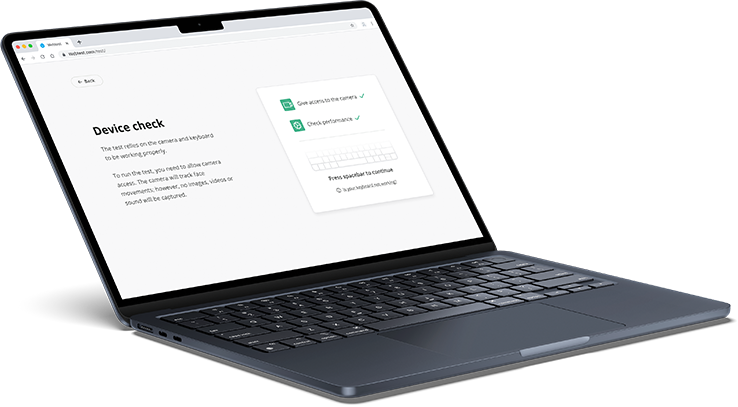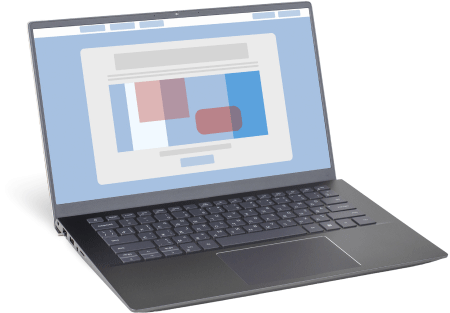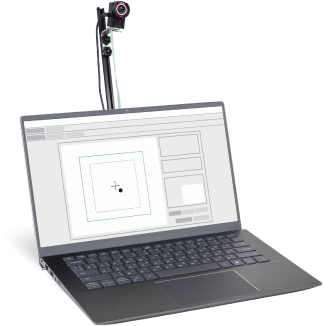QbCheck
Our most flexible clinical and
remote ADHD test
QbCheck is an objective, FDA cleared in-clinic and remote ADHD test.
By standardizing your service, you have greater control over how, when, and where you evaluate your patients – ideal for practitioners who want flexibility to test and treat ADHD in-clinic and remotely.
-
The most flexible ADHD test
-
Test in-clinic or at home
-
Used by 10,000 clinicians worldwide
-
FDA-cleared
What is QbCheck?

Designed to assess patients aged 6-60, it uses a laptop and webcam to capture facial features and track movement.
You can optimize your service by having patients complete the test alongside rating scales at home, giving you everything you need for the clinical interview to make a diagnostic decision.
You can monitor treatment by having patients complete follow-up tests at home and comparing against their baseline results.
In clinic or remote testing options
Built in laptop camera
Instantly generated reports
for diagnosis and treatment evaluation
Comprehensive e-learning modules
Features
Measurement that is aligned with diagnostic criteria
Unlimited clinical user accounts
DSM-5 ADHD rating scale
Pay as you go, bulk purchase, or subscription plan
Through your subscription, you receive:
Clinical interpretation support
Marketing support
Comprehensive training for clinicians
Support to navigate the insurance reimbursement process in the United States*
Qbtech products should only be used in line with their intended purpose according to their label, instructions for use and marketing materials as specified by Qbtech. Always read the label and follow the instructions for use. For more information, visit our legal page.
*In no way does our advice constitute assurance that you will achieve insurance for Qbtech products. Reimbursement varies from state to state and from provider to provider.
Patients follow an attention-based task on the computer screen and press a responder button every time the same shape and colour appear in sequence.
Inattention is measured by variations in correct response time to the stimuli on the screen.
While your patients complete the attention-based task on the computer, activity is measured through a laptop camera which tracks patient’s movements.
Our technology can pick up on the smallest of movements with 1mm precision.
Impulsivity is measured by the number and speed of incorrect responses given.
For example, if patients press the responder button before or after stimuli shows on the screen, or when a shape and color haven’t appeared in sequence.
How you can use QbCheck in your service
In-clinic testing
Assess ADHD in your patients in-clinic by having them complete a computer-based task. Results are instantly available, giving you the flexibility to analyse the results.
Remote testing
You can issue your patients with voucher codes to give them access to our QbCheck platform to carry out the test at home.
This helps to streamline your diagnostic process, provide patients with flexible access to quality assessments, and reduce the need for in-person visits while maintaining clinical reliability.
Benefits of using QbCheck in your practice
Offer flexibility to patients to complete an objective test at home
Have greater confidence in your diagnosis
Measure treatment response with retesting
Easy to interpret reports
Enhance relationships with your patients
Improve patient outcomes with QbCheck
We assessed the performance of remote testing with 6,159 patients. It was found that:
- 95% all patients reported that the instructions were easy to follow
- 94% of patients had an appropriate home test-environment.
What objective data can do for your clinic
Integrating our objective test into your service makes it more efficient and streamlined without compromising diagnostic accuracy. According to the AQUA study, a randomized control which assessed the impact of QbTest:
94%
of clinicians reported a greater understanding of patients’ symptoms
85%
of families said the test is really helpful
153 days’
time reduction from evaluation to diagnosis
20%
of clinical workforce time freed
"QbCheck adds valuable objective data on core ADHD symptoms - inattention, activity, and impulsivity I can't get from any other tool or system. It has improved the accuracy of my ADHD evaluations, communication with my patients and relationships with referral partners."
Want to get in touch?
Feel free to reach out to us with any enquiries that might be on your mind and we will try to get back to you as fast as possible.
QbCheck FAQs
What is the difference between QbTest and QbCheck?
The key difference between the two devices is that QbCheck is online so patients can complete it at home on a compatible Mac/PC or at your practice. QbTest is in-clinic only.
How long does QbCheck take to complete?
QbCheck takes 15 minutes for children ages 6-12 and 20 minutes for adults aged 12-60.
*Qbtech products should only be used in line with their intended purpose according to their label, instructions for use and marketing materials as specified by Qbtech. Always read the label and follow the instructions for use. For more information, visit our legal page.

